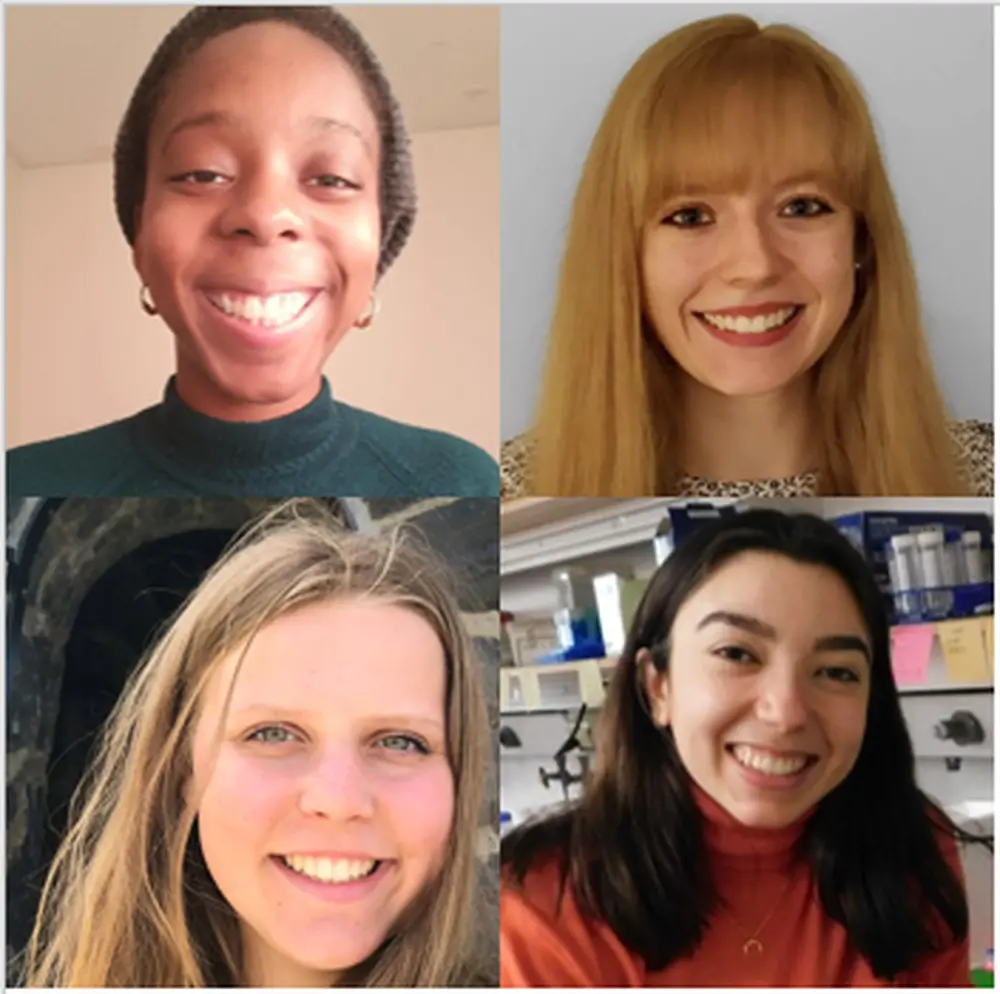
Four chemistry graduate students have been selected 2022 National Science Foundation Graduate Research Fellows and four more were accorded honorable mention.
Danielle Loving, Alexis Lower, Marya Ornelas, and Amy Wahlmeier are among more than 2,100 students to be awarded the prestigious NSF fellowships in the highly competitive program that supports students pursuing research-based master’s and doctoral degrees in science, technology, engineering, mathematics, and social science fields.
Applications are evaluated according to NSF’s two review criteria: intellectual merit and broader impacts. Awardees generally are those who demonstrate exemplary promise as researchers as well as show a record of using their research and related skills to benefit society.
In addition to three-year annual stipends and an allowance for tuition and fees, NSF graduate fellows also have additional opportunities for international research and professional development and the freedom to do their own research at any accredited U.S. institution of graduate education. Typically, awardees are those who demonstrate exemplary promise as researchers and a record of using research to benefit society, according to the NSF.
Four more chemistry students received honorable mention in this year's Fellowship competition. They are graduate students Samantha Barlock (Paul Hergenrother group), Lauren Harris (Andrew Gewirth group), Hannah Elizabeth Way (M. Christina White group), and Austin Woodard (Doug Mitchell group).
Danielle Loving
Research: Second Year Organic Chemistry Student in Martin Burke’s research group, working on integrating automated synthesis and machine learning to optimize challenging Csp3-Csp2 Suzuki-Miyuara cross couplings.
Future plans: To be a professor at a primarily undergraduate institution.
What does it mean to be an NSF Graduate Research fellow? It reinforces that I am fully capable to become a PhD chemist and motivates me to continue to conduct chemical research to make a difference in other individuals' lives.
What do you love about chemistry? I enjoy how there is always more to learn and problems to solve.
Alexis Lower
Research: Second year graduate student in Wilfred van der Donk’s research group, working on two main projects in the lab: determining the function/mode of action of prochlorosins and investigating the mechanism of class II lanthipeptide synthetases. Prochlorosins are a natural product produced by marine cyanobacteria, Prochlorococcus and Synechococcus. These cyanobacteria produce numerous prochlorosins with diverse ring-patterns and, in a collaboration with the Chisholm lab at MIT, we’re trying to figure out why. The class II lanthipeptide synthetases are bifunctional enzymes that catalyze dehydration and cyclization reactions to form thioether-containing macrocyclic compounds. Specifically, I’m working with two enzymes: CylM (involved in the biosynthesis of enterococcal cytolysin) and HalM2 (involved in the maturation of the antimicrobial peptide haloduracin β).
Future plans: My extended family is full of teachers, from preschool to college, and I really enjoy teaching, so I’m drawn to academics. I want to keep an open mind about future jobs though to make sure I’m considering all that’s out there. Outside of research, I’ve been wanting to visit Los Glaciares National Park/the Patagonia region of South America in general. I also hope to one day ski the Alps, though I am a little intimidated by them.
What does it mean to be an NSF Graduate Research fellow? I was shocked when I got the email from NSF and it began with “Congratulations!” My dad was the first person I told, and it’s safe to say he was excited. His fast response was surprising because I texted him around 2 am his time and it was pretty much expletive-free. It means a lot to me to be awarded an NSF GRF! I’m thankful to everyone who helped me with my application: my advisor (Wilfred van der Donk), my letter writers (Dr. Penny Chisholm and Dr. Jordan Axelson), Dr. Colleen Vojak, my peers in CHEM 592, and my dad.
What do you love about chemistry? I took my first chemistry class when I was a sophomore in high school. My teacher, Mrs. Lee, was amazing––she was always excited to teach us new concepts and super energetic during class. During my senior year she started working on getting a PhD in her free time, so Mrs. Lee is now Dr. Lee! Seeing her love for the subject inspired the same feeling in me.
Marya Ysabelle Ornelas
Research: Second year graduate student in Angad Mehta's research group, working on on developing yeast and pseudoviral systems to study proteins involved in the capping of RNA viral genomes.
Future plans: I hope to pursue a career in which I can combine my passions for teaching, research, and science policy.
What does it mean to be an NSF Graduate Research fellow? It means so much! It is a testament to the incredible mentorship, support, and inspiration I have received from professors, family, and friends. As a first-generation student, I would have never imagined I could be pursuing a PhD in Chemistry; having the opportunities I have had at UIUC leaves me feeling profoundly grateful.
What do you love about chemistry? What I love most about chemistry/chemical biology/synthetic biology is how question- and purpose- driven the research is. I love that I get to use my interests in understanding fundamental chemical biology to develop tools that can hopefully someday be used to serve people.
Amy Wahlmeier
Research: Second year graduate student in Liviu Mirica’s research group, working on isolation and characterization of mononuclear Pd(III) complexes and their reactivity.
Future plans: Become a research and development scientist for the government/military.
What does it mean to be an NSF Graduate Research fellow? It's an honor, and I am excited to find out what opportunities this might lead to.
What do you love about chemistry? I love being able to work in a lab and there is never a boring day for me - there are always mysteries and puzzles to solve or new things to discover.